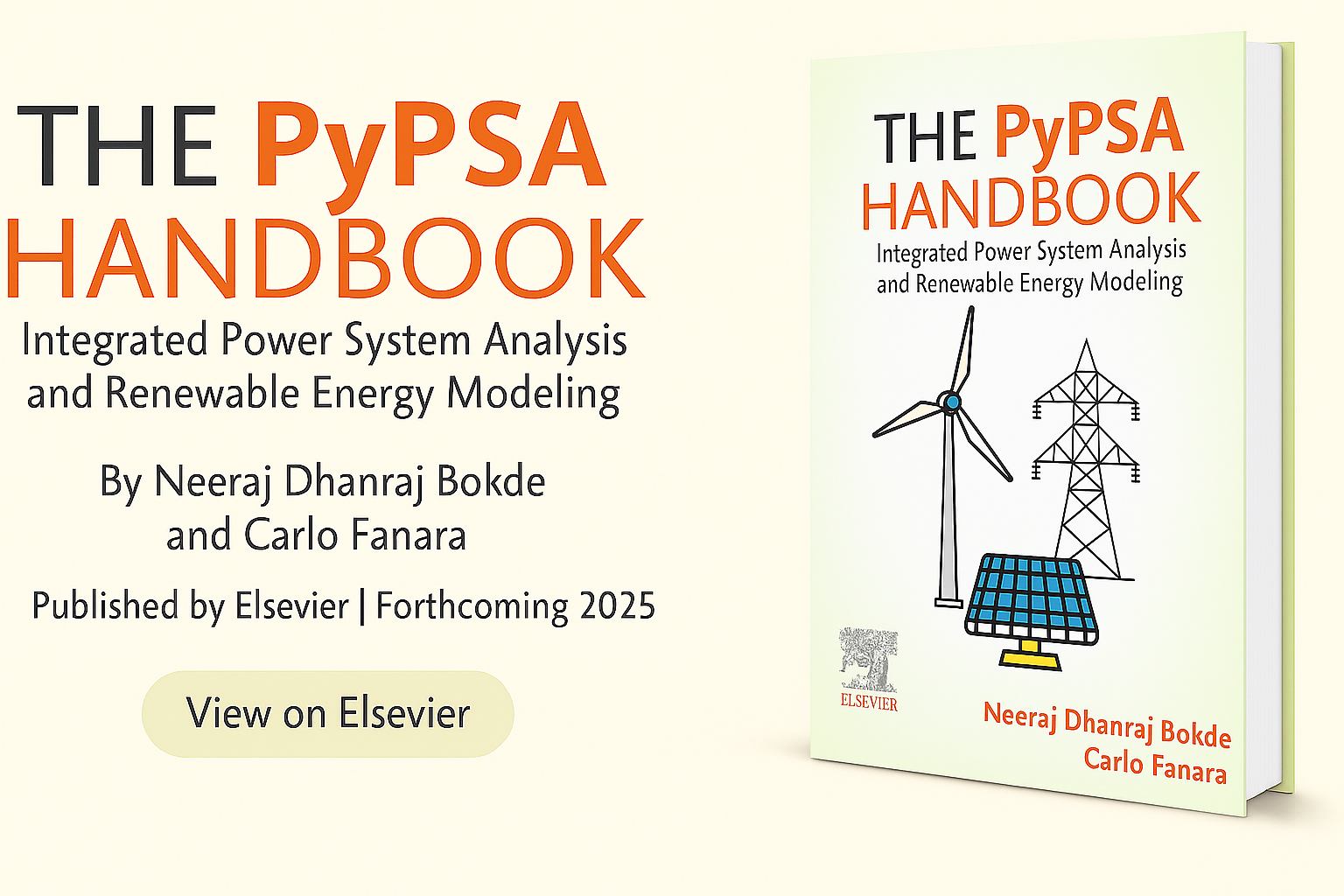The PyPSA Handbook is coming soon

I am happy to share that The PyPSA Handbook: Integrated Power System Analysis and Renewable Energy Modeling, co-authored with Dr. Carlo Fanara, is now in production with Elsevier and scheduled for release in 2025. This book is the result of several years of work in the open-source modeling space, aimed at creating something practical, technically sound, and genuinely useful for both new and experienced users of PyPSA.

Why PyPSA? Permalink
PyPSA (Python for Power System Analysis) has rapidly become one of the most widely used open-source tools for modern energy system modeling. It enables detailed simulations of electricity networks, renewable energy integration, storage systems, grid expansion, and sector coupling within a transparent, flexible, and Python-based environment. Its reproducibility, scalability, and openness make it ideal for academic research, utility planning, and national-level energy studies.
What sets PyPSA apart is not only its technical versatility but also its widespread adoption across global institutions. It is used by international organizations such as the International Energy Agency (IEA), Joint Research Centre (JRC) of the European Commission, and the EU Agency for the Cooperation of Energy Regulators (ACER). In India, PyPSA features in state government energy reports and studies by institutions like The Energy and Resources Institute (TERI). It is also used by major energy think tanks like Ember and in industry-led modeling projects by Saudi Aramco and Shell.
The academic adoption of PyPSA is equally strong. Universities and research institutes across the world apply PyPSA in teaching, theses, and published studies, including Technische Universität Berlin (TUB), Karlsruhe Institute of Technology (KIT), Aarhus University (Denmark), Stanford University, Chalmers University of Technology (Sweden), TU Delft (Netherlands), University of Edinburgh, University of Pisa, University of Oxford, University of Geneva, University of Tromsø – The Arctic University of Norway (UiT), University of Oslo (UiO), Kyoto University, the Reiner Lemoine Institute (Berlin), and the Center for Sustainable Energy Systems in Flensburg, Germany, among others. A growing list of users is available on the official PyPSA documentation.
Why The PyPSA Handbook? Permalink
As PyPSA’s adoption expanded, so did the demand for a clear, structured resource to support both foundational learning and advanced system modeling. While community examples and online documentation are helpful, they can often be fragmented or too tailored to specific use cases. This created the need for a unified and comprehensive reference that balances theoretical depth with hands-on implementation.
The PyPSA Handbook was developed to meet that need. It is intended to serve as a reference book and learning resource for students, academic researchers, system planners, and professionals working in energy modeling and planning. The content emphasizes clarity, reproducibility, and practical relevance, enabling its application in academic courses, research projects, and applied studies in power system design and renewable energy integration.
What’s Inside? Permalink
The book begins with the foundations: installing PyPSA, understanding its architecture, and modeling simple power networks. It then moves step-by-step into advanced topics like dispatch and investment optimization, renewable and storage integration, long-term scenario planning, and system reliability assessments. We have included hands-on examples, complete case studies, and real datasets covering diverse contexts.
Each chapter stands on its own but builds toward a larger workflow. Readers can use the code directly or adapt it for their own studies. We have made sure the content is technically sound but also accessible, so it supports classroom teaching, applied research, and strategic planning equally well.
The finalized cover design is now complete, and the official Elsevier listing is live. The book will be available in both paperback and eBook formats in December 2025.
🔗 Official listing on Elsevier 🔗 Download the official flyer (PDF) 🔗 Full book cover (PDF)
We will be releasing more updates soon, including chapter previews and sample notebooks. For now, we are just excited to get The PyPSA Handbook into the hands of the global modeling community, and to see how it supports your work in building better energy systems.
